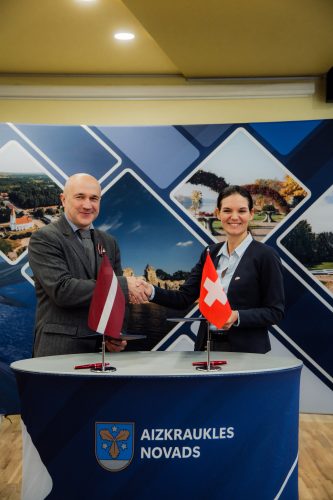With Swiss Financial Support, Latvia Will Improve Diagnosis, Treatment, and Quality of Life for Children with Cancer
To implement patient-centred paediatric cancer care, strengthen international cooperation, adopt best practices, and improve the quality of diagnostics, treatment, and post-treatment follow-up, the Children’s Clinical University Hospital (CCUH) will carry out the Swiss–Latvian Cooperation Programme “Advancement of Paediatric Oncology Care in Latvia” over the next four years.
On 3 June, the Latvian Government approved the regulations for implementing this programme. Its main goal is to improve diagnosis, treatment, and quality of life for children affected by oncological and other rare diseases. The programme is supported by a total funding of 8.8 million Swiss francs (approximately 9.3 million euros), including 7.9 million francs from Switzerland and 1.4 million euros from the Latvian state budget.
Cancer treatment for children is one of Latvia’s key public health priorities. Each year, more than 60 children and adolescents are diagnosed with a malignant tumour for the first time, and cancer is the cause of death for an average of 14 children annually. In treating paediatric cancers, it is crucial to select therapies that minimise side effects and toxicity. For this reason, precision medicine — including molecular diagnostics and targeted therapies — plays an increasingly vital role. The draft 2025–2027 Oncology Care Improvement Plan in Latvia specifically highlights the need to expand access to modern diagnostics and treatment for paediatric cancer patients. Achieving this goal requires stronger international collaboration, involvement in clinical research, and participation in global paediatric oncology networks.
The implementation agreement for the Swiss–Latvian Cooperation Programme was signed in August 2023 by the Swiss Confederation and Latvia’s Ministry of Finance. This enabled CCUH to begin implementing several planned initiatives ahead of the programme’s formal approval.
According to Ieva Bikava, Programme Manager for “Advancement of Paediatric Oncology Care in Latvia”, several key initiatives have already been launched: “Thanks to the opportunities provided by the Swiss–Latvian programme, several important projects have already started at the Children’s Hospital. An education nurse has joined the haemato-oncology department to support both medical staff and families – through direct communication and educational materials, which will also be available on the VeselaPasaule.lv platform.
We are also piloting a system for evaluating patient-reported outcomes (PROM), which helps guide care decisions based on patient needs and strengthens cooperation with families. The programme also provides opportunities for doctors to attend international conferences and participate in professional networks – experiences that contribute to improving care in Latvia.
A key priority is strengthening diagnostics – by introducing new methods and conducting tests in Latvia that previously required sending samples abroad, we can reach more accurate diagnoses more quickly. At the same time, we are developing a sustainable post-treatment follow-up system to help detect potential complications or disease recurrence early,” Bikava explained.
By 2029, with Swiss financial support, CCUH aims to enhance diagnostic capabilities for both paediatric cancer and other rare disease groups. A long-term patient support and health monitoring system will be developed based on evidence-informed practices, helping to measure and improve treatment outcomes and quality of life for children recovering from cancer.
The project also includes the creation of clinical research teams and Latvia’s integration into international paediatric oncology treatment protocols and studies. It will improve multidisciplinary team collaboration and the effectiveness of tumour boards, while also strengthening the capacity of healthcare professionals through specialised training and experience exchange with leading Swiss hospitals.
Key infrastructure improvements are planned: the pathology laboratory will be modernised and digital pathology technologies introduced; a hospital biobank will be established; systems for assessing patient quality of life will be implemented; and overall patient experience will be improved.

Read more



